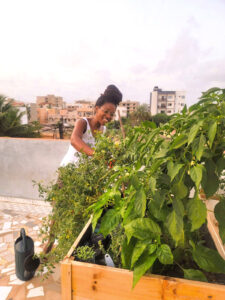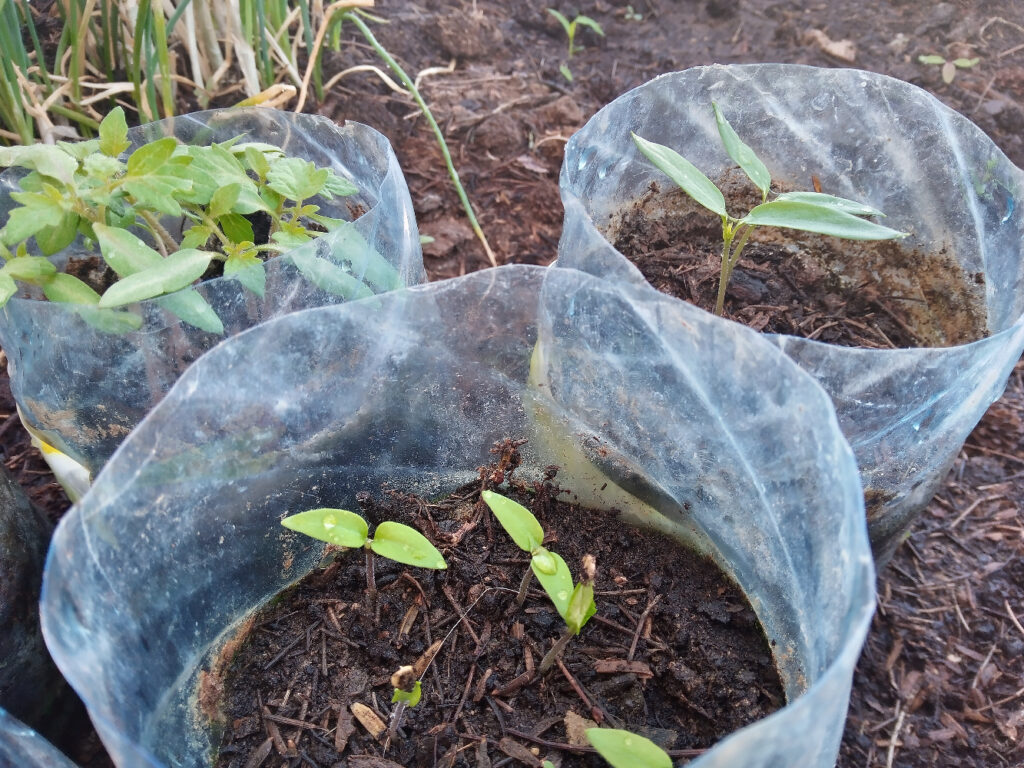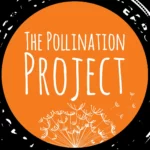19% of children between 6 to 59 months present chronic malnutrition in Senegal, World Food Programme.
“Give your energy to the things you want to happen. If you want to experience change, lead by example,” Rachelle J. Gray, Founder of Lady Gray’s Garden.
As we travel through our life’s journey, we leave a piece of ourselves in the places and with the people we meet and a part of them becomes ours as well. We all have talents and wisdom that can change the part of the world we inhabit for the better, and nothing is more rewarding than leaving behind footprints of kindness and generosity that will enhance the lives of those we encounter in our path. This is something that Rachelle J. Gray practices wherever she goes.
 Rachelle is an enthusiastic and energetic writer, photographer, teacher and heartivist that is determined to leave a legacy of wellness throughout her stay in Senegal by using her garden as a boon to educate residents of Dakar about the great advantages of having urban gardens. In doing so, she is contributing to the cultivation of viable sources of sustainable and healthy eating in their own homes. After all, of all the places in the world, Senegal is the country that has stolen her heart and for Rachelle gardening is her love language.
Rachelle is an enthusiastic and energetic writer, photographer, teacher and heartivist that is determined to leave a legacy of wellness throughout her stay in Senegal by using her garden as a boon to educate residents of Dakar about the great advantages of having urban gardens. In doing so, she is contributing to the cultivation of viable sources of sustainable and healthy eating in their own homes. After all, of all the places in the world, Senegal is the country that has stolen her heart and for Rachelle gardening is her love language.
Rachelle was born in Brooklyn, New York. Her mother is from Barbados, so she considers herself Caribbean-American because she embodies both cultures. She studied Broadcast Production and Business Studies at Buffalo State University in New York and – while she was studying – she discovered her passion for photography. In The Big Apple, she pursued this career for two years and continued to do so when she moved to Barbados, where she opened her own photography studio.
Besides her artistic talents, Rachelle has always had an inherent love for plants that was nurtured by her family from an early age.
“My grandfather was a planter. He grew sugarcane and sweet potatoes;” recalls Rachelle. “On the weekends, we used to go to the land to dig sweet potatoes. He used to say that a house without a tree was not a home. So around our home we had mango trees, guavas, avocados, bajan cherries, coconut trees, golden apple, ackee, and tamarind. That is how I was raised and something that I dream of having here as well in Senegal.”
Senegal: A Fast Growing Nation
According to the World Population Review, Senegal has 17,830,264 inhabitants and it is growing at a 2.75% rate, which means that every year the population of the country increases in over 447,000 people. Its growth is expected to quadruple the population by the end of the century reaching 63.02 million inhabitants; something that affects the ability of providing wellness to its population due to the fastness of its growth.
In fact, according to the World Food Programme, there is not enough food production to comply with the Senegalese population’s needs and this combined with the increase in food prices creates food insecurity among the inhabitants, so much that 19% of children between 6 to 59 months present chronic malnutrition in the country. This in part inspired Rachelle to embark on cultivating urban gardens that could provide sustainable produce right at home.
Discovering the Wonders of Dakar
Rachelle is a free spirit. Two years after finishing college, she decided to live in Barbados and in 2018, she took another leap of faith and set her sights on Dakar, Senegal.
“In 2015 I wasn’t feeling creative and my son told me: ‘maybe you need to move’. He asked me where I would go if I had the opportunity to choose anywhere in the world to visit. I thought about it and I made a list, and at the top of the list was Senegal,” remembers Rachelle. “When I lived in New York I used to dance in Harlem. Back then, there was a growing and flourishing Senegalese community. It is where I first ate Yassa, where I drank my first bissap, that’s where I first came into contact with Senegalese people and their culture, and I have good memories from those interactions.”
Rachelle fell in love with the country, embracing its energy and experiencing the cultural renaissance of Dakar, a cosmopolitan and vibrant city where people are redefining themselves and reassessing their paths.
“I like the people’s modesty, their discipline, and how they greet you by saying peace to you,” says Rachelle.
Like many Dakar homes hers has two balconies and a terrace. In those spaces, Rachelle decided she needed to have plants in order to feel at home, just like her grandfather had taught her.

For the Love of Plants
Besides having ornamental plants, it was very important for Rachelle – who loves Ital, which are Rastafarian vegetarian dishes – to have a garden where she could grow her own fruits and vegetables.
“I enjoy going to the market,” says Rachelle. “Here you can find the basic vegetables, but spinach, bok choy, kale, broccoli or varieties of lettuce you can‘t. And I also like knowing where my food comes from as it relates to pesticides and fertilizer use.”
Rachelle started attending urban rooftop gardening classes with a Moroccan teacher who is a farmer. He taught her how to make compost, where to buy the things she needed to garden and how to grow plants. But he doesn’t live in her neighborhood. Soon after, she thought that this knowledge could benefit her surrounding community by providing them with sustainable and healthy food. That is when the project, Lady Gray’s Garden & Plant Nursery, was born.
Through her project, Rachelle plans to help create 15 urban gardens that will provide Dakar residents with access to fresh nourishing produce to supplement the diets of families and singles. In order to achieve that she will host workshops and organize activities geared towards self-reliance and having the know-how needed for cultivating healthy food through urban gardening.
“In addition to experiencing my garden thriving and growing, I hope for it to be a space where cultures intersect and common interests are nurtured. Where folks are supported in creating their own green spaces,” says Rachelle.
In order to make this project a reality, Rachelle reached out to The Pollination Project to buy a garden shed, potting bench, raised planters, composter unit, and garden tools.
“I was very happy when I got the news that my project was selected for funding because I know this will make a big difference for the better in the lives of many people,” says Rachelle. “I am very grateful to The Pollination Project for making it happen. The most important thing that I have learned while doing my project is that if you want to experience change, lead by example. I wanted to consume organically grown produce in tandem with creating a greener environment while existing in an urban space. Now, two balconies and a terrace later, that is my reality, not because someone did it for me, but because I took the initiative.”
Join Us
If you are inspired by this work and have an idea for a project that addresses an issue that you are passionate about, we’d like to invite you to submit an application and together we will build a better, more compassionate future!
If you would like to support the work of more changemakers like this around the world, please visit our donation page and be a part of the change today!


